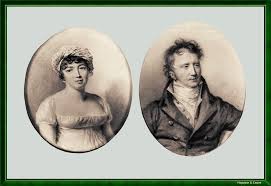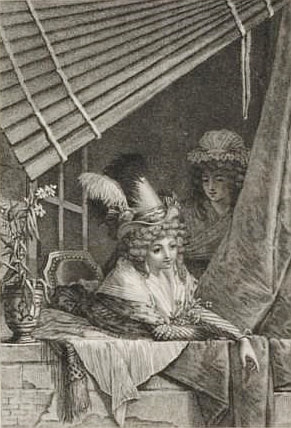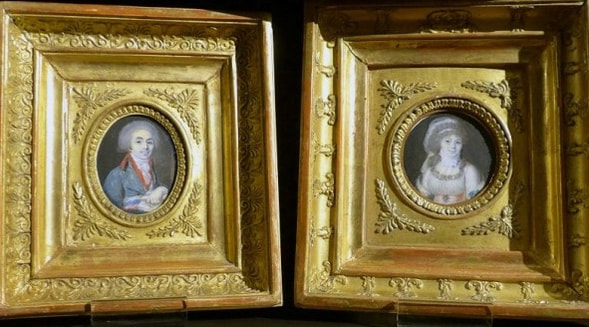|
If women philosophers of the 17thcentury are occasionally brushed off as being not ‘proper philosophers’, but ‘learned maids’ , those of the 18thcentury, at least in France, were from the earliest records, classified as salonières. So Madame de Stael, the author of 30 published works, novels, plays, philosophical and political reflections is best known for the fact that she held a salon in which famous men came to talk. In fact, her output was a little bigger than that of her lover and most famous associate, Benjamin Constant. As to the difference in quality – who knows? Until recently her works have not been studied by philosophers, whereas Constant’s have. A look at Jules Michelet’s Women of the Revolution (1855) shows what the implications of calling women salonières were. This volume is comprised of portraits that Michelet had sketched in his History of the French Revolution (1847-1853, 9 volumes). Sophie de Grouchy is described as a Salonière, a beautiful woman who was skilled at entertaining republicans, and who, moreover, was the dutiful wife of one of the revolution’s greatest intellectual, Condorcet. One senses that Michelet thinks we should be grateful that she looked after this national genius, and enabled him to shape the future of the republic. But to him she was no more than that. Manon Roland, a ‘femme de coeur’ is given an example of womanly republican virtue. She is just as Rousseau wanted women to be – domestic, ruled by their heart, and entirely given to nurturing the virtues of the republic in their family. But Manon, Michelet adds, is rather more muscular and less ethereal than Rousseau’s Julie, for instance. And when she sees that being nurturing and domestic is no longer enough, she acts – she exerts her political influence through her salon. Michelet does not mention Olympe’s salon, and does not seem to be aware of it, picturing her in crowds, among the women of the people and making much of her supposed ignorance: “She was quite illiterate.” He wrote. “It was even said that she could neither read nor write at all.” However noble he may have thought her, this is what stands out. Olympe, the writer, could not read or write. But the most telling chapter in Michelet’s book is not on individual salons, or famous women, but on the moral downfall of the Girondins. This is towards the end of the volume, whereas the more flattering descriptions of individual women are closer to the beginning. In 1793, Michelet said, the Girondins were giving in either to suicide or to depravation: gambling, and orgies. Many women, whether professional prostitutes or milliners were involved. But it was not just the lowly prostitutes who finished off the brave Girondins. Michelet goes on to elaborate on the way women can and did cause the downfall of men. “women, especially, and even the best, in such a case, exert a dangerous influence to which there is no resistance. They influence by their graces, but still more often by the touching interest they inspire, by their frights which they wish calmed, and from the happiness they really feel at receiving support from you. […] These ladies were very skillful, being careful not to show the after-thought. The day, good, moderate, and mild republicans would be seen in their salons. The second day, Feuillants and Fayettists would be presented to you.” And before you knew it, he continues, the charming salonist had turned your royalist. And even ‘true love’ Michelet continues, contributed to the downfall of the Gironde: “The love of Mademoiselle Candeille was conducive to the destruction of Vergniaud. This pre-occupation of the heart increased his indecision and his natural indolence. It was said that his mind seemed to be wandering elsewhere, and they were right. This mind, at a time when the country should have claimed it entirely, inhabited another soul.” Julie Candeille was a successful composer and famous actress – who had taken on the role of Mirza in Olympe de Gouge’s abolitionist play. Her acting career ended in 1798 and she concentrated on music till her death in 1834. Pierre Victurnien Vergniaud was an orator for the Gironde. He was the last of the 22 Girodins to be executed on 31 October 1793.
0 Comments
Leave a Reply. |
About
This is where I live blog about my new book project, an intellectual biography of three French Revolutionary women philosophers. Categories
All
Archives
November 2022
|



 RSS Feed
RSS Feed